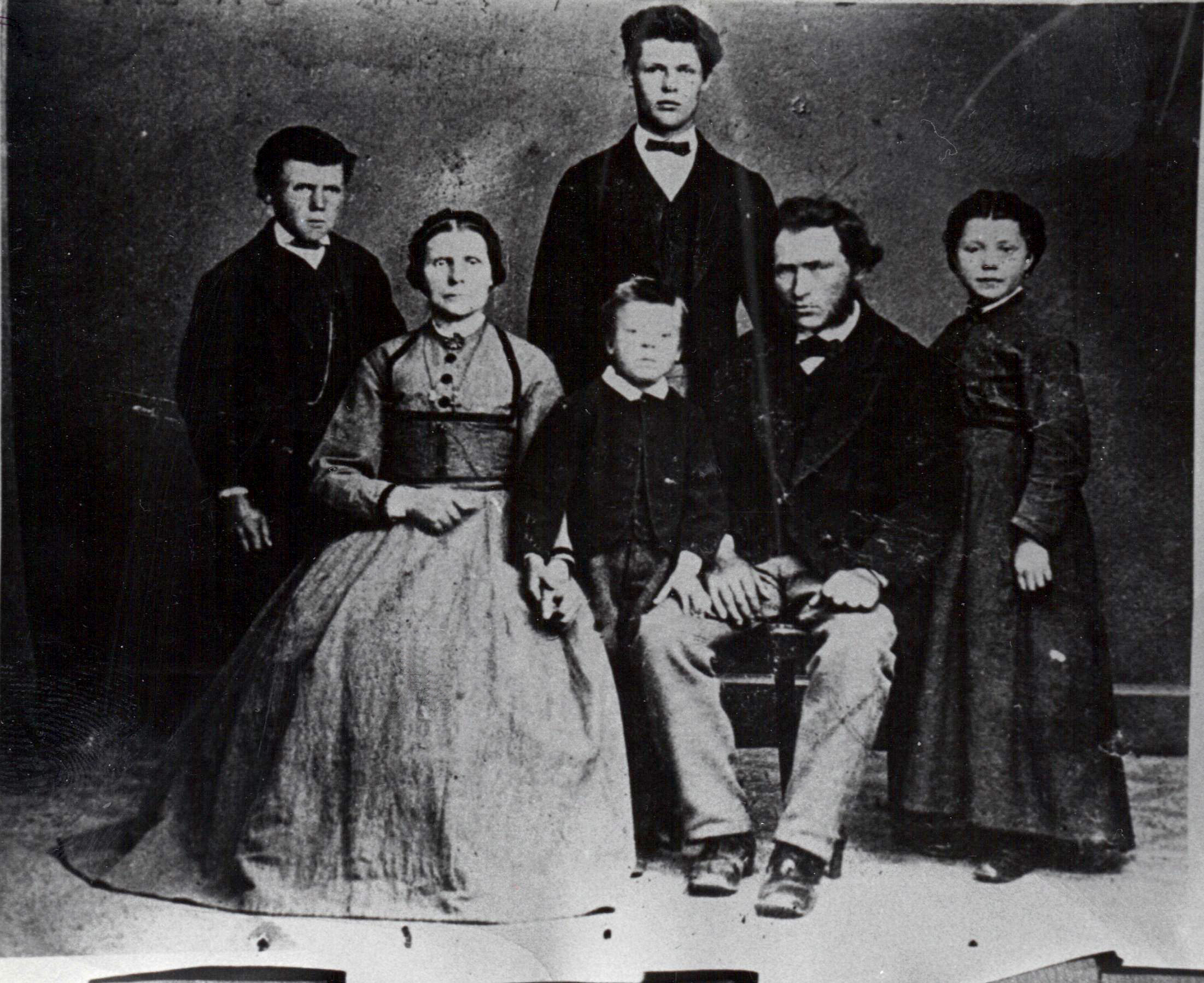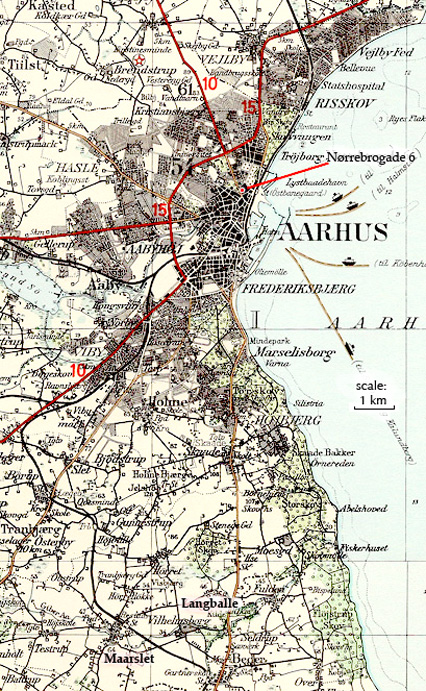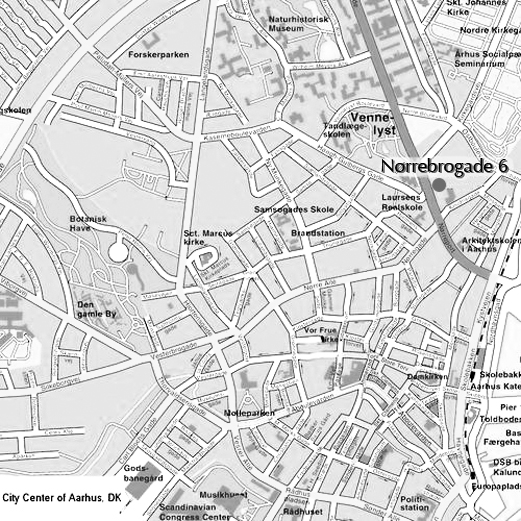
Chapter 3
Chapter 5
Back to Table of Contents.
Chapter 4
Hans and his family moved to the Aarhus region (also spelled Århus) on the Jutland peninsula fairly soon after moving to Gierslev: "In about 1860 they moved to Jutland (Jyland) thinking they could get away from persecution, but as the Church grew, persecution grew with it, so the Sorensen family endured much those first years." 1 Their last child, Parley Peter, was born there on July 11, 1862. Parley was not a Danish name, but the LDS population knew the name well. As mentioned before, Parley P. Pratt's pamphlet, "Voice of "Warning" was translated into Danish in 1855. 2 (The family first heard the Gospel in 1857, two years later.) People were quite affected by his writing and, over the years, many children of members were named Parley in his honor. According to family genealogy, Parley Sorensen was born in Maarslet, a small town southwest of Aarhus. His birth is not recorded in the parish records since the family was not part of the local (government) religion. About two years later, on October 27, 1864, Parley's sister, Mette Marie was baptized. The LDS church records say that she was baptized in Langballe, which is about 3 kilometers ENE of Maarslet and about 8 km south of the city of Aarhus. Andrew William was baptized in Maarslet on January 26, 1866, according to the same records. 3
In Maarslet the family all worked for their living and earned money in hopes of emigration. Ane's history reports: "In 1865 the three oldest children were hired out to learn a trade. Soren Peter was learning the trade of a tailor, Mette Marie started as a maid, and Andrew William worked as a hired hand." 4 William recalls: " [His father, Hans] got work as a stone cutter. He rented a little place about six miles from the city where we could keep a cow and a few chickens. … Our home was called Mosgaard Hus. We could have all the bread and milk we could eat, but it was a little different with mother. She had to be alone and care for us, and tend the chores, but she together with father would work with love to support us, and were happy to know they were members of the Church of Christ and that they had a testimony of the same and that they could live in peace." 5
The Wallace Sorensen and Anne Poole histories give some details of their life in those first years in the Maarslet area: "Hans Hendrik6 Sorensen was ordained to the office of Elder and he worked and preached faithfully in his native land for many years. He was a talented speaker and he had a gift of expressing himself so that many listened to Him. He was a stone cutter and mason by trade. In Denmark it was hard to get rock for building purposes, consequently he had to go into the woods and dig deep to find rock, or go in a boat out into the ocean and draw the rocks up out of the water. In the year 1865 or 1866 the family was living about four miles from the city of Aarhus, close to the beautiful woods. The Elders came often to the Sorensen home and were always welcome. Finally the Elders prevailed on the family to move into the city of Aarhus and live at the Church headquarters there. This they did and grandmother [Ane] kept house and cooked for the Elders faithfully and well for five years. Grandfather [Hans] was faithful to his callings in the Church. The entire family enjoyed the sweet spirit of the Gospel, although some of the members had to leave home to work to help make a living for the family." 7
Andrew William tells of his and his sister's experience working to earn money for the family: "My father hired me out to a man by the name of Handrop. I should have two dollars for the first summer and a pair of wooden shoes. I would herd cows in the grove. … Soon it was spring again. I was then hired for a year to the same man and my wages were double. … My sister worked for the same man the next year. That made it a little better for me." 8 Their experience in school was not pleasant. Andrew William says that he was persecuted for his religion: "… it wasn't long until the children knew that I was a Mormon boy, and nearly all the school children hated me. Even the teacher could hate and if he could get half a chance he would punish me more than the rest because I was a Mormon boy. I would tell my mother at night when I got home. She would console me by saying, 'You do not need to care for that, they will soon stop and the time will soon come when we will get [out] of Babylon and go home to Zion.'" 9
War again was declared between Germany (Prussia/Austria) and Denmark in 1864. The war, or the disputed territory that caused the war, was just 190 kilometers (114 miles) south of the home of Hans Sorensen. The area of Schlesvig/Holstein was in dispute again and Denmark laid claim to a certain level of sovereignty (as they had done in 1848). That area between Denmark and Prussia was considered to be somewhat neutral, with the people having dual nationality. Germany was not the defined nation it is currently, but was a loose confederacy of kingdoms and duchies. Any threat to those people who felt loyalty to the German/Prussian Dukes and Barons caused the leaders of this confederacy to bring their army to bear. The Danes were woefully outnumbered in the dispute and the main result was loss of life among the Danish people. The effects of this war had a significant impact on the church in Denmark. According to the history of the mission: "It was an unhappy war for Denmark and the Church alike, because so many young men were taken from home into the army. Many of these young men were native elders who had been working as missionaries for the Church." 10 In the mission report sent at the end of the year (1864), Carl Winderborg, President of the mission, reported: "Our increase in Denmark this year has not been so large on account of the unhappy war, which tore many of our best elders from their field of labor, and in some measure suspended the labors of the few elders that remained in the field." 11 It was also noted in the history that this caused the conversion numbers in Denmark to drop to the lowest point since 1851.
It does not appear that Hans and his family were directly affected by the war. He was nearly 40 at the time and his oldest son was 15, so they probably were not enlisted into the army. However, the history mentions that Hans and his family worked closely with the Elders and were very involved with the work, so problems in missionary work affected them.

The Hans Sorensen Family in Aarhus, about 1868
Andrew William, Ane, Parley, Hans, Caroline, with Soren Peter in back
The family moved into the center of the city of Aarhus somewhere between 1866 and 1868. Ane's history records: "The President of the mission, J. Howgaard requested that Ane, her husband and family move in the Mission Home where Ane would be the cook and housekeeper." 12 Caroline described it: "When I was between 7 and 8 years of age we lived about four miles out from the city of Aarhus, close to the beautiful woods. The elders came often to our home and finally prevailed on my parents to move to the city and live with them at headquarters so that my mother might be their cook and housekeeper, which she faithfully did for nearly five years. During that time my father labored in his calling in the Church whenever his financial circumstances would permit, and we did enjoy the sweet spirit of the Gospel while living under that influence. Even we children partook of it, those of us who could stay home and who were not compelled to work for our living." 13 This was also an opportunity for the family to learn English: "President Howgaard and his wife taught their family to read and write in English so it would be an easier adjustment when they emigrated to Utah." 14
Andrew William relates his continuing experiences: "My father then hired me out to another man … Now my schooling was ended and it was a limited one. I could scarcely write my own name. … I had too much work to tend eleven cows and many other chores. … I was sometimes so tired that I could not sleep at night. Now I had no mother to run and see for she had moved to the city of Aarhus, as father had his work there and mother did housekeeping for the missionaries. So I had to bear my burden. … I stayed there two years and endured many hardships." 15 He was then allowed to go home: "When my time was up father came to take me home to help him cut rocks and I was glad of it. … I had a good father and would do all in my power to learn how to handle the hammer. In the evenings I could go home and see my dear mother. That was a treat for me and I could also have a chance to read and write both in Danish and English. … We would work late and early to try to get enough money to go to Zion, but it seemed to be impossible and sometimes father and I would get disheartened. Thus we worked three years." 16

This is a map of the city of Aarhus, including the towns of Maarslet and Langballe.
Living in Aarhus must have been quite a change for the family, because they had lived in the country or in very small villages all their lives and now they were in the center of one of the largest cities of Denmark. According to the 1870 Census, 17 they lived at the address Nørrebrogade 6 (Nørre means north and gade means street in Danish). This is likely where the church headquarters were located in Aarhus.
Their oldest son, Søren Peder is not listed in this census. He is also not listed among those baptized. He did not join the church with his family but stayed in Denmark and raised a family there.
Next door to the Sørensens another LDS family is listed: Carl Georg Jørgensen 18 and his family of 5, at Nørrebrogade 8. This is probably in the same building. At present there is a large apartment-type building at this address that could possibly be from that time.

Nørrebrogade 6, just north of the center of the city of Aarhus
(map from University of Aarhus, Denmark.)
After a lifetime in the country, the family begins to experience life and missionary work in the big city.
1. Poole, unpublished history, also the same in Sorensen/Day.
2. On May 13, 1857, Elder Pratt was assassinated in Arkansas, which was reported in the LDS publications. Undoubtedly, the Sorensens would have been aware of his martyrdom.
3. LDS church records, Aarhus branch, LDS Family History Library film 0041938 page 157:
Line 13: Hans Sorensen, born 30 October 1825, Kragevig, baptized 5 February 1858, Torpegavn, by O. Poulsen, confirmed 14 February 1858 by Andersen, Emigrated 21 June 1872.
Line 14: Ane Sorensen, born 25 December 1822, Munke Bjergby, baptized 5 February 1858, Torpegavn, by O. Poulsen, confirmed 16 February 1858, by O. Poulsen, Emigrated June 1871.
Line 15: Mette Marie Sorensen, born 4 October 1851, Rus Vedby, baptized 27 October 1864, Langballe, by H. Sorensen, confirmed 27 October 1864, by N. Christiansen, Emigrated 12 July 1870.
Line 16: Anders Vilhelm Sorensen, born 9 November 1854, Hallenslev, baptized 26 January 1866, Marsleth, by H. Sorensen, confirmed 26 January 1866, by S. Iversen, Emigrated 21 June 1872.
4. Ane Nielsen Sorensen history, p 4.
6. Note: Some histories, including this one by Wallace Sorensen were influenced by erroneous research in giving Hans Sorensen the middle name of Henrik, Hendrik or Henrich. For further details, see the Appendix.
7. Poole unpublished history, and Wallace Sorensen unpublished history.
10. Danish Mission History, p 92.
11. Mission History, December 23, 1864; Jenson, History, p. 182, as quoted and referenced in Danish Mission History, p 93.
12. Ane Nielsen Sorensen history, p 4.
13. An unpublished history of Caroline Sorensen Buchanan, also Sorensen, unpublished history.
14. Ane Nielsen Sorensen history, p 4.
17. Danish Archives Online, Århus 1870 Census, Nørrebrogade 6 (Kobn: Amt: Holbæk, Sogn: Gierslev ) Opslag 25.
18. Danish Archives Online, Århus 1870 Census, Nørrebrogade 8 (Kobn: Amt: Holbæk, Sogn: Gierslev ) Opslag 25. Family listed as:
Carl George Jørgensen (33), Vilhelmina Caroline Carlsen (29), Kjerstine Frederikke Emilie Jørgensen (5), Charles Fred. Wilhm Jørgensen (2), Emma Frederike Carlsen (17)